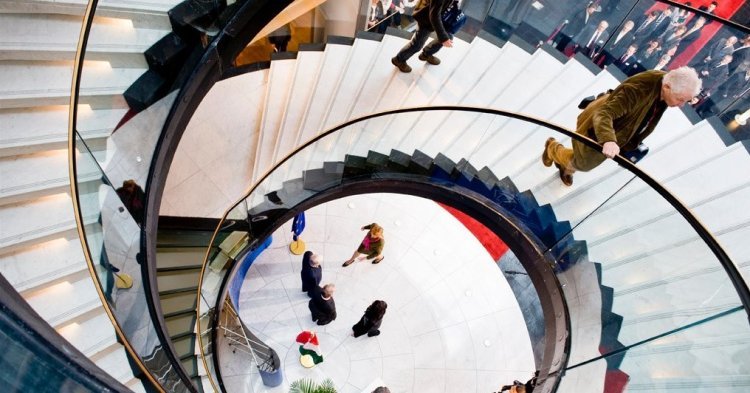A Small World
When you read Gabriella Adèr’s report, one thing rapidly strikes you: the European district obviously works as a city inside the city. The two main institutions, the Commission and the Parliament, are settled in big buildings where people can find anything they may need. One MEP confirms it; the Brussels bubble draws you in and you have no reason to get out of it, since everything is at your disposal. The Parliament building in Wiertz Street, offers a laundry, a hairdresser, a gym, a supermarket and three banks. Next step: a nursery? Even during their free time, EU civil servants do not escape the microcosm. Most of them attend the same restaurants, the same bars and the same parties. That is actually quite logical as a large majority live far from home and their social life relies on their European connections. Even more, most people know they have to accept being part of this microcosm if they want their European career to progress. Everything depends on your network.
Unsurprisingly, EU civil servants share a similar profile. They have received higher education, they have lived in several countries, they speak various languages, they are open to the world and they support the EU ideals – whereas a majority of EU citizens live in non-metropolitan regions or relatively small cities and believe the growing globalisation threatens its country’s identity. EU civil servants are not all aware of that gap. Some Eurocrats adopt a paternalist behaviour and insist they know what’s best for European citizens. Other people whom Gabriella Adèr interviewed, proved to be concerned by this disconnection. Having lived in Brussels for a long time and having no relationships outside the institutions, they wonder how they can possibly know what European citizens’ expectations are.
The 751 MEPs should be best placed to maintain a link with European citizens. Indeed, they have been elected by them and are supposed to express their voice. Most of them make an effort to meet their voters; they invite students to discover their work environment and they participate in political debates or Citizens’ dialogues. However, they acknowledge that involving citizens in the decision-making process is not an easy thing. One MEP whom Gabrielle Adèr interviewed was sorry about not being in contact with ordinary people anymore. In her own words, the building is hard to access and meeting citizens requires a great deal of effort.
Twilight Zones Which Foster the Rise of Euroscepticism
Despite the communication effort made to shed light on the way the institutions work, European citizens also experience this feeling of disconnection. You do not need to be a follower of conspiracy theories to believe that hidden interests influence the way decisions are made. As an example, Gabrielle Adèr mentions the fact that the European Commission is supposed to penalise Member States who do not correctly apply its rules. Nevertheless, the sanctions are fewer and fewer. National permanent representations have gained power and put more and more pressure on decision-makers so that their country’s interests are not endangered.
In addition, the institutional system was conceived in order to be as fair as possible, yet it has revealed its own limits. The Commission proposes and implements laws, which are discussed and voted on by the Council of Europe and the European Parliament. The former is represented by ministers from national governments, who are more and more reluctant to give their consent when it comes to thorny subjects, such as the refugees’ quotas or the fight against tax avoidance. The same occurs with the Parliament, partly because they keep an eye on elections, which take place every five years. As a result, the Commission has let down the proposals which would be automatically rejected by the Council of Europe or the Parliament, to the extent that many MEPs have complained about not having law projects or resolutions to study.
In that context, a gap is growing between the importance of the challenges the EU is faced with and the responses which are given. Jean-Claude Juncker was well aware of what was at stake when he was elected at the Commission’s presidency in 2014. He set up a list of ten priorities, in order to make the work of the “last chance Commission” efficient. Unfortunately, reality has compromised the will of the Commission’s team to “get Europe moving again”.
In that situation, the status quo is the general rule - which fosters the rise of Euroscepticism. The EU is an easy scapegoat for people who suffer from economic and social crisis. Even more so when national politicians and media fuel it. A lobbyist explained to Gabriella Adèr that when heads of Member States manage to have difficult measures adopted by the EU, they would congratulate themselves and then tell their fellow citizens that the decisions had been imposed by Brussels. The national media often play the same game, using the neutral denominator “Brussels” when they deal with EU news, instead of reminding people that decisions are taken by MEPs elected by citizens, in agreement with Member States’ representatives.
How to break this deadlock? Though communication and information have a clear role to play, it seems that the way the system works should be rethought. The only chance to succeed with this process is to exchange views with people outside the “Bubble”. New digital tools are being developed in order to involve citizens in the EU political activity. The “civic tech” represents a real opportunity to reconnect with citizens, through new types of participation. European citizens have things to say – Euroscepticism should not be seen as a threatening opponent to EU politics but as a demonstration of the people’s desire to make their voices heard . In other words, the people’s urge for a more efficient democracy.


Follow the comments: |
|
